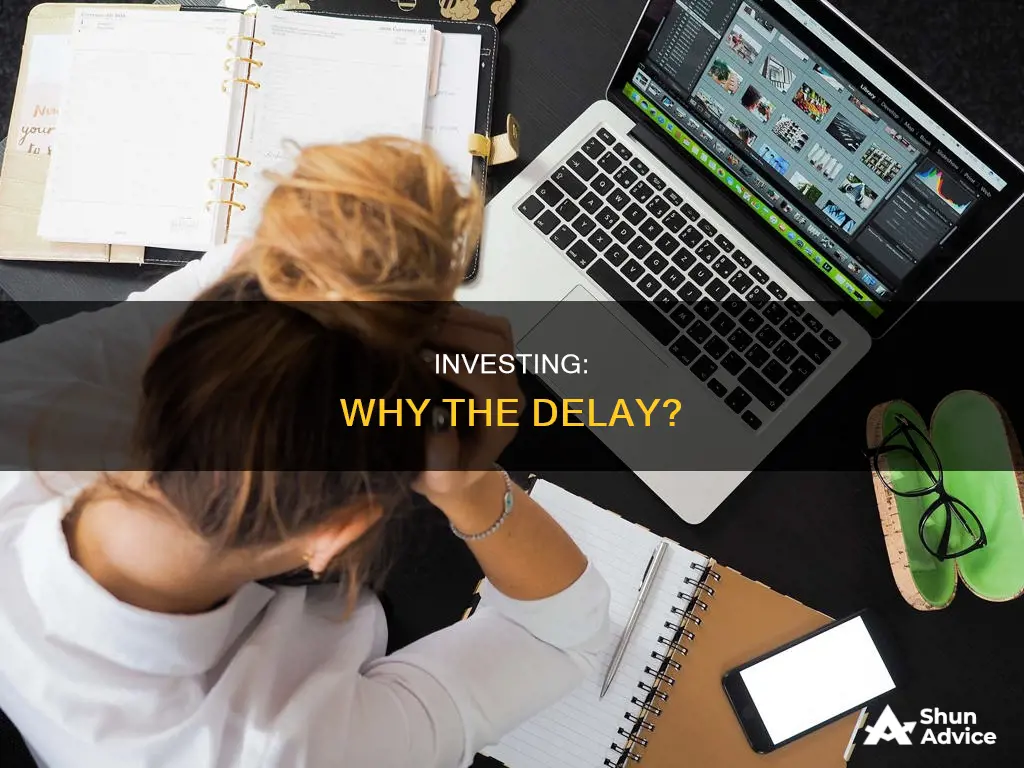
There are many reasons why people delay investing, from procrastination and fear of making the wrong choice to the urge to chase returns and instant gratification. However, delaying investing can be costly, with missed growth opportunities and the loss of compounding effects over time. The longer an investor waits to enter the market, the more they may miss out on potential gains, especially when approaching retirement. Understanding the impact of compound interest is crucial, as each additional year of growth makes a significant difference. For example, an investor who starts with $100,000 and saves $20,000 annually with an 8.49% return will have approximately $1.5 million after 20 years. However, delaying the process by just one year results in a loss of over $140,000, highlighting the opportunity cost of delaying investment decisions.
| Characteristics | Values |
|---|---|
| Procrastination | Fear of making the wrong choice, too many investment choices, too many calculations |
| Lack of urgency | Long-term goals, such as retirement, seem distant |
| Fear of loss | Fear of losing money is greater than the joy of gains |
| Herd mentality | Following the crowd, especially during market volatility |
| Short-term gratification | Instant gratification is addictive, especially with technology at our fingertips |
What You'll Learn

Fear of making the wrong choice
The fear of making a wrong investment decision often stems from a lack of knowledge or understanding of the various investment options. To overcome this fear, it is essential to conduct basic research and educate oneself about different investment products, their risks, and potential returns. Seeking advice from financial advisors or online platforms can also help individuals make more informed decisions.
Additionally, it is important to understand the concept of compound interest, which is a key factor in wealth creation. Compound interest means that money grows exponentially rather than in a straight line. Therefore, the longer one's money remains invested, the greater the potential returns. Delaying investing, even by a year, can result in significant opportunity costs and impact one's ability to meet long-term financial goals.
For example, consider an investor who starts with $100,000 and adds $20,000 to their portfolio annually, with an average annual return of 8.49%. If this investor delays investing for a year, they could lose out on over $140,000 in potential gains over a 20-year period. The cost of delay increases with a longer time horizon; a one-year delay in a 30-year investment plan could result in a loss of over $320,000.
In conclusion, while the fear of making the wrong choice is understandable, it is important to recognize that inaction can also have negative consequences. By educating oneself, seeking advice, and understanding the power of compound interest, individuals can overcome their fear and make more informed investment decisions.
Movie Investment: Why Take the Risk?
You may want to see also

Too many investment options
There are many reasons why people delay investing, and one of the most significant factors is the overwhelming number of investment options available. With the ever-growing range of investment choices, it can be challenging for individuals to make a decision. This phenomenon is known as "choice overload".
The abundance of options can lead to a state of indecision and inertia, causing people to take no action at all. They may leave their money idle in a bank account, earning minimal interest that is often negated by inflation. While it may seem safer to keep money in a bank, it is important to understand that the real interest earned is often negligible or non-existent when inflation is taken into account. For example, with an inflation rate of 3.69%, a bank deposit with a 4% interest rate results in a real interest rate of only 0.299%. This means that the purchasing power of the money has barely increased, if at all.
On the other hand, investing in mutual funds or other types of investments can offer significantly higher returns. For instance, investing Rs 1,00,000 in a mutual fund for 5 years with a 3.69% inflation adjustment would result in a value of Rs 2.38 lakhs, compared to Rs 1,01,560 in a savings account. This highlights the opportunity cost of not investing due to choice overload.
To overcome choice overload, individuals can conduct basic research to understand the different investment products available. Online resources and financial advisors can also provide valuable guidance in making informed decisions. By taking action and investing, individuals can harness the power of compounding, which can lead to substantial gains over time.
When Investors Stop Investing
You may want to see also

Fear of loss
The fear of losing money is a primal instinct, deeply ingrained in our psyche. It is a survival instinct, and for much of human history, losing resources could mean life or death. This fear is reflected in the concept of 'loss aversion', which suggests that the pain of losing money is psychologically twice as powerful as the pleasure of gaining it.
This fear of loss can lead to indecision, inaction, inertia, apathy, inattention, and internal resistance. People may avoid investing due to this fear, as they value potential gains less than potential losses. This fear can also lead to procrastination, with people delaying investment decisions due to the fear of making a wrong choice.
To overcome the fear of losing money, it is important to change one's mindset. It is crucial to understand that investing is not the same as gambling. Investing involves making calculated decisions based on research and analysis. Diversifying one's portfolio is also essential, as it helps to spread risk and avoid putting all one's eggs in one basket.
Additionally, it is important to remember that investing is a long-term endeavour. It requires patience, as it may take a long time for the market to gravitate towards value. Market volatility can be scary, triggering our natural fight-or-flight response. However, it is important to stay calm and stick to a long-term investment plan during volatile periods.
Finally, seeking help from financial advisors or online platforms can be beneficial. They can provide guidance and help individuals make informed decisions about their investments.
Investing Strategies During Economic Downturn
You may want to see also

Procrastination
Fear of Making the Wrong Choice
People often delay investing due to the fear of making the wrong investment decisions. With numerous investment options available, the fear of choosing the wrong investment avenue can be overwhelming. This fear may lead to "choice overload," causing individuals to avoid investing altogether and leave their money idle in a bank account, even though the interest earned may not keep up with inflation.
Complexity and Calculations
Investing can involve complex calculations and considerations, such as estimating retirement needs or education costs while accounting for inflation, market returns, and risk. The perceived complexity of these calculations may deter some people from starting their investment journey.
Short-Term Gratification
Human nature tends to favour short-term gratification over long-term gains. The availability of instant gratification in various aspects of life, such as technology and social media, has contributed to this tendency. However, when it comes to investing, delaying gratification can lead to better outcomes. Compound interest, for example, can lead to significant growth in investments over time.
Anxiety Over Losing Money
The fear of losing money is a common emotion that may cause individuals to procrastinate on investing. This anxiety is particularly prominent during periods of market volatility. However, it's important to recognise that timing the market is challenging, and trying to do so rarely works in an investor's favour.
Lack of Urgency
For individuals with long-term investment goals, such as retirement planning, there may be a lack of urgency to start investing immediately. However, delaying investing can have a lasting impact. Each year of delay means missing out on potential growth opportunities and the benefits of compound interest.
To overcome procrastination in investing, it's crucial to understand the potential costs of delaying investment decisions. Seeking guidance from financial advisors, conducting basic research, and starting with small investments can help individuals overcome their hesitation and improve their long-term financial outcomes.
How to Legally Invest for Others
You may want to see also

Lack of knowledge
Firstly, a lack of understanding about the potential benefits of investing can lead to procrastination. Many individuals face a "starting problem", where the fear of making a wrong decision or being overwhelmed by choices causes them to delay taking any action at all. This inertia can be detrimental, as money left idle in a bank account may lose value due to inflation, resulting in missed growth opportunities over time.
Additionally, the prospect of having to make complex calculations to determine future financial needs can be daunting for those with limited financial knowledge. Estimating the amount needed for retirement or education, while accounting for factors like inflation, risk, and market returns, can seem like a tedious and challenging task. This lack of knowledge can lead to a cycle of procrastination and inertia.
The fear of making the wrong investment choices is also a significant barrier. Individuals often prefer the "devil they know", opting to keep their money in low-interest savings accounts rather than exploring potentially more lucrative investment options. This can result in their money earning minimal interest, which may not even keep pace with inflation, effectively eroding its value.
Moreover, a lack of knowledge about the impact of compound interest can further contribute to delays in investing. Compound interest allows money to grow at an accelerating rate over time, and delaying investment means missing out on the powerful effects of compounding in the later years. This is a critical concept for individuals to understand, as it can significantly impact their financial outcomes, especially during the crucial years leading up to retirement.
To overcome these challenges, individuals should educate themselves about different investment options and conduct basic research. Seeking guidance from financial advisors or online platforms can also help navigate the complexities of investing. By taking these steps, individuals can make more informed decisions and potentially improve their long-term financial prospects.
Investments: How Much is Too Much?
You may want to see also
Frequently asked questions
People often delay investing due to procrastination and the fear of making the wrong choice. They may also feel overwhelmed by the many investment options available and the complex calculations involved.
Delaying investment can result in missed growth opportunities and reduced compound interest over time. Each year of delay brings higher costs and lower potential returns.
Depositing money in a bank account with a low-interest rate may result in losing value due to inflation. Investing in the market offers higher potential returns and the benefits of compound interest over time.
People can conduct basic research to understand different investment options and seek help from financial advisors. Starting with mutual funds or similar options can also help overcome the fear of market timing.







